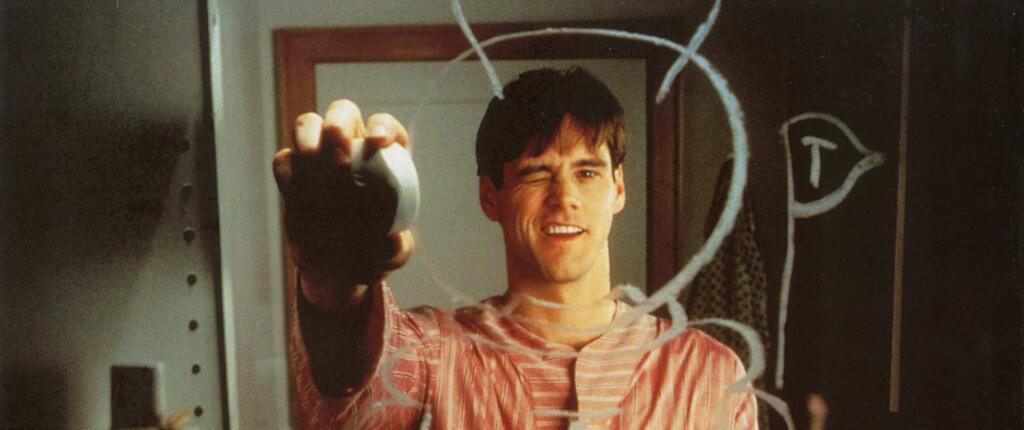Europe’s 'Truman Show' moment: is it time to walk off Trump’s set?
Issued on:
When Truman Burbank finally realises that his life is a television show – every neighbour an actor, every event scripted – he faces a terrifying choice: walk through the exit door into the unknown, or carry on in a comfortable illusion. Is this is the predicament Europe is facing under Donald Trump’s second term?

In his report for the European Sentiment Compass 2025, Pawel Zerka, of the European Council on Foreign Relations, suggests Europe is living its own “Truman Show moment”.
The United States, he says, is no longer the ally Europeans had been accustomed to having. Instead, under Trump, Washington is not only pulling the strings in trade, defence and digital disputes – it is waging an outright “culture war” on Europe.
The big question is whether the EU has the courage to step off the set, reclaim its autonomy and begin writing its own story.
Europe's uncertainty after Trump's first 100 days

Trump 2.0
Transatlantic tensions are nothing new. Rows over trade, NATO spending and climate policy have flared under every president from Kennedy to Obama. But Zerka insists that Trump marks a rupture.
“There is a clear difference vis-à-vis previous presidents, and even vis-à-vis Donald Trump 1.0,” he told RFI. “Before, we had never seen a US president targeting Europe so clearly and aggressively.”
This time round, the barbs are sharper, the interventions more deliberate. Trump openly mocks Europe’s migration and climate policies, last week using the world stage of the United Nations to declare that Europeans are “going to hell” with their “crazy” ideas.
Such rhetoric, Zerka argues, is not just bluster. It is part of a deliberate strategy to humiliate Europe, a way of painting the European Union as weak, dependent and incapable of agency.
And this culture war is not confined to speeches, Zerka says – the Trump administration has moved from commentary to active interference.
In Germany, US Vice President JD Vance and former Trump advisor Elon Musk openly backed the far-right AfD party during the country's legislative elections in February.
Similar interference was seen in Poland, Romania and Ireland, where Washington lent support to Conor McGregor, a former mixed martial arts champion who had thrown his "Make Ireland Great Again" hat in the ring for the country's upcoming presidential election on 24 October, but withdrew from the race in September.
McGregor's political ambitions had been boosted by an invitation to the White House on St Patrick's Day, with Trump calling him his "favourite" Irish person.
“We haven’t seen anything like this before,” Zerka stresses. “There’s such active involvement in domestic politics of European countries, supporting rivals of the governments in place – and very often those rivals are problematic political players.”
“There is a lot of appetite among the European public for an assertive Europe, but leaders keep finding themselves in situations where they look ridiculous and Europe gets humiliated” – Pawel Zerka
Europe’s new right: how the MAGA agenda crossed the Atlantic
A Truman moment
So what does it mean for Europe to “walk off the set”? In Truman Burbank’s case, it was about courage – daring to leave behind the artificial comfort of a staged life. For the EU, Zerka says, it is about dignity and identity.
“European leaders must be ready,” he argues. “Currently they are buying time with Trump, because they depend so much on America for security, especially with Russia’s war in Ukraine. But the danger is that by playing along, they risk repeated humiliation – whether at NATO summits or in trade negotiations – where Europe ends up looking ridiculous to its own public and to the wider world.”
The challenge, Zerka believes, is that many EU leaders still don’t grasp the true nature of the confrontation.
They treat disputes over tariffs or defence spending as technical haggles, missing the larger picture – that they are part of a cultural battle over values, sovereignty and the very meaning of the West.
Without that recognition, Europe risks stumbling from one Trump-scripted crisis to another, always reacting, never setting the agenda.
In Pawel Zerka’s European Sentiment Compass 2025 report, EU member states fall into five roles within Trump’s “reality show”.
Director’s crew
Countries actively producing Trump’s show in Europe, amplifying MAGA narratives:
Hungary, Italy, Slovakia – with the Czech Republic possibly joining.
Tempters
Those who normalise Trump’s script by offering comfort and status within the status quo:
Austria, Belgium, Czech Republic, Finland, Greece, Ireland, Netherlands, Portugal, Romania, Spain, Sweden.
Prophets
The truth-tellers urging Europe to break free of the illusion:
Denmark, after Trump questioned its sovereignty over Greenland. Sweden and Finland could also play this role.
Extras
On set but lacking influence, even when embroiled in MAGA-style battles at home:
Bulgaria, Slovenia, Croatia, Estonia, Latvia, Lithuania, Luxembourg, Cyprus, Malta.
Door holders
The big players whose choices could determine the plot’s direction:
France, Germany, Poland.
The role of the prophet
In The Truman Show, it was a character named Sylvia who first whispered the truth to Truman, that his life was staged. In today’s Europe, Zerka sees Denmark as playing that role.
Trump’s suggestion that the US might buy Greenland directly questioned Danish sovereignty, giving Copenhagen a unique impetus for defending European autonomy.
“Denmark is the one country really trying to show Europe the difference between reality and illusion,” Zerka says, adding though that Sweden and Finland, both scarred by the Russian threat and largely resistant to Trump’s personal appeal, could also be well placed to push for European autonomy.
Then there are what he calls the “door holders”, the heavyweight countries whose choices could swing the EU’s future one way or another: France, Germany and Poland.
Each stands at a crossroads. Elections in the coming years could see them drift towards the pro-Trump “director’s crew” – Hungary, Italy, Slovakia – or rally behind the prophets calling for strategic autonomy.
The outcome, Zerka warns, will determine whether Europe claims its agency or sinks deeper into dependency.
Can Europe withstand the ripple effect of the MAGA political wave?
Walking the line
However, with Russian aggression on its doorstep, Europe cannot simply sever ties with Washington. Yet, Zerka argues, the notion that Europeans must appease Trump to preserve the transatlantic bond is a fallacy.
“It’s completely the other way around,” he says. “Only if Europe steps up in building its own capacities, and shows assertiveness, can it become a real partner rather than a subordinate.”
That means investment in defence, technology and energy resilience. It also means recognising the culture war for what it is, and refusing to be defined by Trump’s caricatures.
Trust in the EU is its strongest since 2007, with polls showing that citizens increasingly view the bloc not just as an economic club but as a community of shared values, and destiny.
Zerka believes European leaders must harness the public appetite for a more assertive Europe. The risk of inaction, he warns, is cultural subordination.
The reward of courage, by contrast, is the chance for Europe to write its own story, and participate in the transatlantic partnership as an equal.
Daily newsletterReceive essential international news every morning
Subscribe